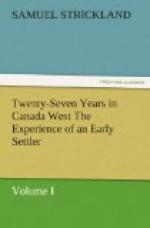I was very sorry to hear of Mr. Galt’s retirement. He had always acted in a kind and liberal manner towards me; and, indeed, when he left the Company, I considered that I had lost a true and affectionate friend. I could not help, therefore, noticing with regret that, although most of the clerks belonging to the office were at that time in Toronto, only Dr. Dunlop, Mr. Reid* [* Mr. Galt’s friend and ornate secretary.] and myself accompanied Mr. Galt to the landing-place to see him depart and cry “God speed!” But this is the way of the world. Those who should be most grateful when the hour of adversity dawns on their benefactor, are often the first to desert him.
On the same day the Doctor introduced me to one of our new Commissioners, Thomas Mercer Jones, Esq., a fine gentlemanly-looking person. The other Commissioner was the Hon. William Allen. These gentlemen were appointed by the directors to supersede Mr. Galt in the direction of the Company’s affairs in Canada. On my return to Guelph, I received an intimation that I must prepare to take up my residence in Goderich, as my services in future would be required in the Huron tract.
A few days before my departure, I witnessed the most appalling land tornado (if so I may term it), I ever saw in my life. As this is a phenomenon seldom if ever witnessed in England, I think a particular description may possibly interest those readers who are unaccustomed to such eccentricities of Nature.
In my hunting excursions and rambles through the Upper Canadian forests, I had frequently met with extensive windfalls; and observed with some surprise that the fallen trees appeared to have been twisted off at the stumps, for they lay strewn in a succession of circles. I also remarked, that these windfalls were generally narrow, and had the appearance of a wide road slashed through the forest.
From observations made at the time, and since confirmed, I have no doubt Colonel Reid’s theory of storms is a correct one, viz.:—“That all windstorms move in a circular direction, and the nearer the centre, the more violent the wind.” Having seen the effects of several similar hurricanes since my residence in Canada West, I shall describe one which happened in the township of Guelph, during the early part of the summer of 1829.
The weather, for the season of the year (May) had been hot and sultry, with scarcely a breath of wind stirring. I had heard distant thunder from an early hour of the morning, which from the eastward is rather an unusual occurrence. About ten A.M. the sky had a most singular, I may say, a most awful appearance; presenting to the view a vast arch of rolling blackness, which seemed to gather strength and density as it approached the zenith. All at once the clouds began to work round in circles, as if chasing one another through the air. Suddenly, the dark arch of clouds appeared to break up into detached masses, whirling and eddying through each




